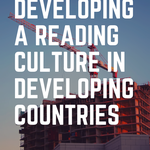If you have been living in one or if you are traveling to one, you won’t have much access to the bookish stuff offered to much of the rest of the world. Below are some bookish things I wish developing nations had access to, to develop and improve their reading culture.
What’s more, you can also find plenty of book accessories there that are not simply available elsewhere.
OverDrive-Powered Digital Libraries
While some publishers from developing countries have partnerships with book lending platforms, the content the libraries offer is so meager. Though in my case, OverDrive doesn’t have partner libraries in the Philippines. Seriously, none at all. That’s because they prefer print books over other digital formats. I think this must also be the case with other countries where ebooks and audiobooks are still a novelty. Nada. Do you get what I mean? This is what it feels like to live in low- and middle-income countries. Ebooks and audiobooks are not even commonplace in the library. I even did a sweep of the Pan-Asia region and found out that only two developing nations have OverDrive-powered digital libraries. I’m a little bit jealous. Meager collection or not, these digital libraries will be of big help to those who can’t afford to buy books. A 2014 UNESCO study in some developing countries found that “people read more when they read on mobile devices, that they enjoy reading more, and that people commonly read books and stories to children from mobile devices,” The Guardian reports.
Fast and Reliable Postal Service
In most countries, orders from international online bookstores usually take a while to arrive. For instance, the book you order from UK-based Book Depository, which attracts bookworms with its “free” shipping service, takes over a month—and sometimes more—to get into your hands! Imagine the frustration of having to wait for a year to read the last book of your favorite series; and then another month on top of that. You still don’t know who killed who and if that billionaire was tamed.
Conclusion
It’s not my intention to pit these two groups against each other nor to illustrate the wide berth between them. After all, the terms “developing” and “developed” may imply different meanings. Their usage is still a developing debate, as NPR notes. But for the sake of simplicity, we’ll go by Study.com’s definition of developing countries as those that are “less industrialized and have lower per capita income levels.” We already know the benefits of reading books for everyone especially children, and so I just wish everyone had a fair access to them, as much as possible. The bottom line is, everyone will be encouraged to read if there’s a faster way to access books—whether full-fledged online bookstores or heavily stocked digital libraries. What are the other ways that you think can help develop a strong reading culture in developing countries?

